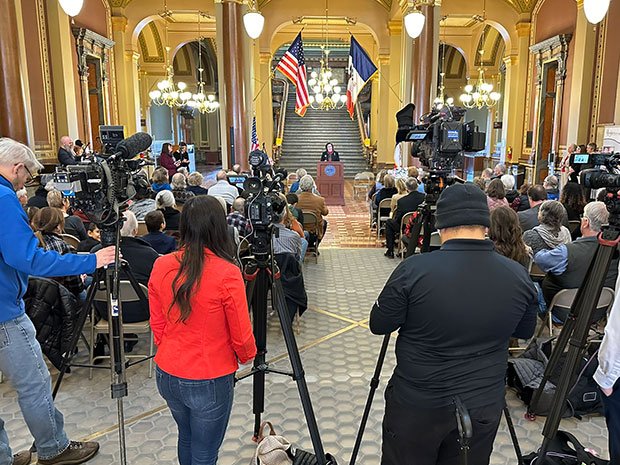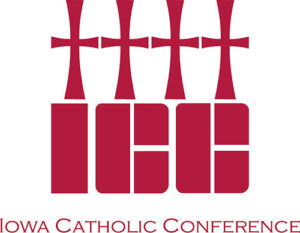
Gov. Kim Reynolds talks during the Prayer for Life event at the State Capitol in Des Moines.
By Tom Chapman
For The Catholic Messenger
An Iowa Senate subcommittee has passed the “Med Act” (SSB 3006), a bill to protect healthcare personnel from being required to provide a healthcare treatment if they regard the treatment as being harmful.
Dr. Lauris Kaldjian, director of the bioethics program at the University of Iowa’s medical school, testified in support of the bill. She said, “As a society, if we want to respect moral diversity and moral freedom in our communities, we need to protect healthcare professionals and institutions from being forced into moral compromises that cut against the core of who they are.” The Iowa Catholic Conference (ICC) also spoke in support of SSB 3006. It is now eligible for consideration by the full Senate Judiciary Committee.
Iowa MOMS
The ICC also testified at a subcommittee in support of HF 2057, which includes some fixes to the Iowa MOMS program that funds services for pregnant women. This bill allows the option of having the state Health and Human Services (HHS) department as the program administrator. The refinements in HF 2057 would allow nonprofits that don’t do counseling to receive Iowa MOMS funding to offer non-medical resources such as diapers, formula, cribs and car sets. The bill goes to the House Health and Human Services Committee for further consideration. Iowa HHS also awarded Iowa MOMS funds last week to four nonprofit agencies.
E-Verify
The ICC opposes SF 108, which passed a subcommittee in the Senate last week. The bill would mandate the use of the optional federal E-Verify system. The internet-based system compares information from an employee’s Form I-9, Employment Eligibility Verification, to records available to the U.S. Department of Homeland Security (DHS) and Social Security Administration (SSA) to confirm the employee’s authorization to work in the United States (e-verify.gov).
The ICC holds that E-Verify should only be made mandatory if it is undertaken in the context of a bigger immigration reform package. This bill is also duplicative in part because the federal government already is authorized to investigate employment violations in this context. The bill is now eligible for consideration in the Senate Judiciary Committee.
Migration bills
Subcommittees in the Iowa House are scheduled to consider bills related to migration this week. One such bill is HF 2112, which relates to the smuggling of persons as well as qualifications for government benefits. The Church does not encourage illegal immigration as it is sometimes not good for the migrant or for society. The migrant might live in fear of public authorities and the people who brought them here. The Church supports the right of a sovereign nation to control its borders and we understand that the situation at the southern border cannot continue as it has. However, the ICC has registered against HF 2112.

The first part of the bill sets up a redundant system to check whether people are qualified for benefits. There is no objection to the principle that only people who qualify should receive benefits. The problem arises in a mixed-case household where some people are citizens and some do not have authorization to be in the United States. The proposed process might intimidate the person seeking to apply for benefits on behalf of their children and discourage that person from applying.
The second part of the bill defines smuggling of persons as “Encourage or induce a person to enter or remain in the United States in violation of federal law by concealing, harboring or shielding that person from detection.” Does “encourage” or “induce” or “harboring” mean providing food or shelter to an immigrant? Does it mean a person sending money home to a family? Those actions should not be out of bounds.
We continue to ask our leaders in Washington, D.C. to ensure “border protection policies that are consistent with humanitarian values while allowing the authorities to carry out the critical task of identifying and preventing entry of terrorists and dangerous criminals.
Death penalty
A subcommittee hearing on a bill to bring back the death penalty, SSB 3085, was set for Monday. While it is a duty of the state to punish offenders and defend the common good, the Church opposes reinstatement of the death penalty to send the message that a cycle of violence can be broken without taking yet another life.
Area Education Agency
Discussions continue with the governor’s office and legislators on clarifying a bill to overhaul the Area Education Agency system, which provides services for special education as well as professional development across the state.
Religious freedom
 The ICC registered in support of HSB 614 and SF 2095, the “Religious Freedom Restoration Act (RFRA).” This bill is very similar to the federal law that has been in place since the early 1990s. More than 20 states have a very similar law and around 10 states have a similar provision due to court action. The bills, introduced last week, provide that government should not substantially burden a person’s exercise of religion, unless applying that burden serves a compelling government interest and is the least restrictive means of furthering that interest. RFRA creates a balancing test in the courts to weigh a person’s right to act consistent with their religion against the government’s desire to pursue its interests in a way that violates that right. This bill doesn’t grant anyone any new rights and protects people of all faiths.
The ICC registered in support of HSB 614 and SF 2095, the “Religious Freedom Restoration Act (RFRA).” This bill is very similar to the federal law that has been in place since the early 1990s. More than 20 states have a very similar law and around 10 states have a similar provision due to court action. The bills, introduced last week, provide that government should not substantially burden a person’s exercise of religion, unless applying that burden serves a compelling government interest and is the least restrictive means of furthering that interest. RFRA creates a balancing test in the courts to weigh a person’s right to act consistent with their religion against the government’s desire to pursue its interests in a way that violates that right. This bill doesn’t grant anyone any new rights and protects people of all faiths.
(Tom Chapman is executive director of the Iowa Catholic Conference.)











